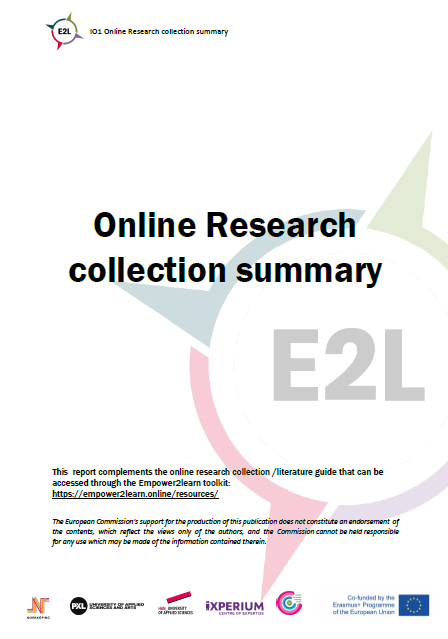IO1 – Online research collection
On this page you can read more information on the Intellectual Output number one: online research collection
Goal
The goal of this output as well as the starting point of the entire E2L-project has been to collate and explore the theoretical angle of personalised learning with digital technologies. This intellectual output has resulted in a literature guide that makes available the most up to date research and reports into the potential of ever-changing digital technologies (including adaptive technology and artificial intelligence) as well as teacher competencies to use digital technologies to support students’ personalised learning.
Activities
The process for conducting the scoping study and online collection has involves several steps:
- formulating the research questions and objectives
- searching for relevant reports, studies, research and other information
- rating and screening of information for inclusion
- extracting data
- analysing data
The proposed overarching question for IO1 has been: What are the promising and established practices that are effective in personalising learning with a view to improving outcomes for learners in K-12 education. This has guided the partners in their search through available research and websites. Materials have been referenced with title, year, author and URL, rated, categorized into type and length (time of reading), tagged in agreed available categories (for example personalised learning, CPD, curriculum design) and accompanied with a short description of the main points covered in the material.
The literature guide contains over 50 pieces of literature on how AI, adaptive technologies and other digital tools have the potential to support personalised learning as well as evidence of how effective teacher CPD can improve teachers’ ability to use these technologies. The collection is accompanied with a report that presents what is meant by personalised learning and how adaptive and AI-based tools are being used to support it. The report also examines some of the issues around such use, from privacy and ethics to the nature of the teaching and learning involved while nodding to the next intellectual output in which examples of promising practice will show how personalised learning can and does happen in different educational settings.
Expected impact / Results
- Educators, teachers and policymakers will have an improved understanding of the definitions of personalised learning, the range of approaches and technologies to deliver it in the classroom and the different educational theories and interpretations which underpin those approaches in the partner countries and internationally
- Educators, teachers and policymakers will have an improved understanding of the ethics of EdTech companies creating products using adaptive technologies and artificial intelligence to support personalised learning




